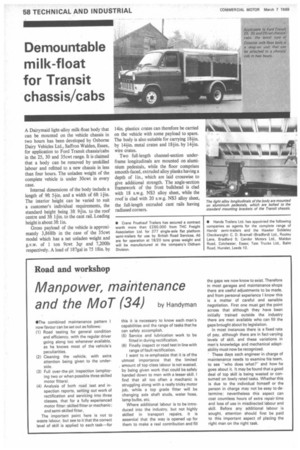Road and workshop
Page 60

If you've noticed an error in this article please click here to report it so we can fix it.
Manpower, maintenance
and the MoT (34) by Handyman
OThe combined maintenance pattern I now favour can be set out as follows: (1) Road testing for general condition and efficiency, with the regular driver going along too whenever available. as he knows most of the vehicle's peculiarities.
(2) Cleaning the vehicle, with extra attention being given to the underside.
(3) Full over-the-pit inspection (employing two or when possible three skilled motor fitters).
(4) Analysis of both road test and inspection reports, setting out work of rectification and servicing into three classes, that for a fully experienced motor fitter; skilled fitter or mechanic; and semi-skilled fitter.
The important point here is not to waste labour, but see to it that the correct level of skill is applied to each task—for this it is necessary to know each man's capabilities and the range of tasks that he can safely accomplish.
(5) Service and lubrication work to be fitted in during rectification.
(6) Finally inspect or road test in line with range of fault rectification.
I want to re-emphasize that it is of the utmost importance that the limited , amount of top-class labour is not wasted. by being given work that could be safely handed down to men with a lesser skill. I find that all too often a mechanic is struggling along with a really tricky motor job, while a top grade fitter will be changing axle shaft studs, water hose. lamp bulbs, etc.
Where additional labour is to be introduced into the industry, but not highly skilled in transport repairs, it is essential that the way is opened up for them to make a real contribution and fill the gaps we now know to exist. Therefore in most garages and maintenance shops there are useful adjustments to be made. and from personal experience I know this is a matter of careful and sensible negotiation. First one must get the point across that although they have been initially trained outside the industry there are men available who can fill the gaps brought about by legislation.
In most instances there is a fixed rate of pay, although there are in fact varying levels of skill, and these variations in men's knowledge and mechanical adaptability must now be recognized.
These days each engineer in charge of maintenance needs to examine his team, to see "who does what?" and how he goes about it. It may be found that a good deal of top skill is being wasted or consumed on lowly rated tasks. Whether this is due to the individual himself or the person in charge may not be easy to determine; nevertheless this aspect can cost countless hours of extra repair time and loss of use in misdirected labour and skill. Before any additional labour is sought, attention should first be paid to this important aspect of placing the right man on the right task.












































































































































































